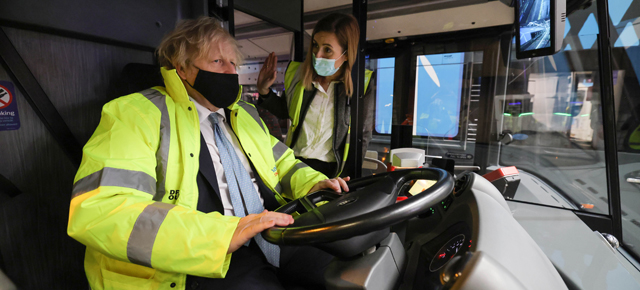Bus Strategy marks biggest bus reform since the 1980s to achieve ‘substantial and untapped potential’

Bus operators in England will no longer design and provide local bus services in isolation, in a major reform of the deregulated system that has existed outside of London since the 1980s.
The National Bus Strategy, which was published this week and is championed by prime minister Boris Johnson, declares that “our system isn’t working”. It sets a timetable for bus operators and local transport authorities to agree plans to achieve the “substantial and untapped potential” of buses, using either Enhanced Partnerships or franchising.
I love buses, and I have never quite understood why so few governments before mine have felt the same way
In the foreword to the strategy, Johnson writes: “I love buses, and I have never quite understood why so few governments before mine have felt the same way.”
He adds: “As we build back from the pandemic, better buses will be one of our major acts of levelling-up.”
Operators get support – but cooperation needed
Just days after becoming prime minister in July 2019, Boris Johnson set out his domestic priorities in a speech in Manchester. Buses usually don’t even get a second look from secretaries of state for transport, but Johnson placed them at the heart of his agenda.
“I love buses,” he declared. “I will begin as a matter of urgency the transformation of local bus services.”
More than 18 months has passed since then, including the distractions of a general election, Brexit and a global pandemic, but this week saw the prime minister reveal his plan for transforming buses in England. In the foreword to the National Bus Strategy, Johnson again professes his
love for buses, before adding: “For governments of all colours before this one, the bus has been last in the queue.”
“Our system isn’t working,” the strategy declares. So it promises the biggest reform of the way the bus industry operates since deregulation in the mid-1980s. Deregulation has not been dissolved, but it seems that Leon Daniels, Transport for London’s former managing director of surface transport, was right to predict that “the swashbuckling days of the deregulated 1980s have gone”.
Bus operators must in future work closely with local transport authorities and mayoral combined authorities to design co-ordinated, easy-to-understand bus networks. Otherwise they won’t receive any of the £260m a year Bus Service Operators Grant (BSOG), the Covid-19 Bus Services Support Grant (CBSSG) or the £3bn that the government committed last year to “level up buses across England towards London standards”.
Outlining his proposition to bus operators, Johnson writes: “The [bus] industry has had almost £1bn in emergency funding, and will need significant public support for some time to come. The deal for operators is that we will give you that support, and the measures to unstick traffic that you have wanted for years – but in return, we need your cooperation and partnership to deliver the policies in this strategy.”
The timetable for change is ambitious considering the limited resources of many local transport authorities after years of budget cuts. Assistance will be available in the form of £25m in 2021/22 to support partnership and franchising development, including a Bus Centre of Excellence.
In every way, the pandemic has made our job more urgent. We must build back greener, minimising pollution and tackling the congestion that clogs up our towns and cities
“In every way, the pandemic has made our job more urgent,” explains Johnson. “We must build back greener, minimising pollution and tackling the congestion that clogs up our towns and cities.”
The strategy seeks to make buses across England become “more like London’s”, but that does not necessarily mean embracing the route-by-route tendering regime that exists in the capital. The LibertyBus franchise in Jersey is cited as an alternative model.
The government will support the use of franchising “where it is in the best interests of passengers”, but expects that the majority of local transport authorities will choose Enhanced Partnerships, the other option on the table, as their end state. Others may use Enhanced Partnerships as a stepping stone to franchising.
An Enhanced Partnership is a statutory arrangement under the 2017 Bus Services Act which can specify, for example, timetables and multi-operator ticketing, and allows the local transport authority to take over the role of registering bus services from the Traffic Commissioners.
Local branding that reflects the community and not the operator should be adopted, “though successful existing brands such as Harrogate’s 36 should not be sacrificed”.
To benefit from the available funding, local transport authorities will be expected to implement “ambitious bus priority schemes”. Statutory traffic management guidance will meanwhile be updated to make promoting bus reliability an integral part of highway authorities’ Network Management Duty.
The government will support the purchase of at least 4,000 new zero emission buses, more than a tenth of the fleet. It will also set a date for ending the sale of new diesel buses in the UK.
In lower-density, often rural areas, “not served or barely served by conventional buses”, the government will support new forms of provision, such as demand responsive transport using smaller vehicles.
As well as spending more money, the government will “fundamentally reform how it is spent”. BSOG, “a fossil fuel subsidy”, will be reformed so that it takes a holistic approach targeted at the delivery of the policies in the bus strategy and other specific benefits: growing patronage, increasing efficiency, improving the environment and securing modal shift from the private car.
The government will meanwhile review whether it remains right that local authorities cannot set up new bus companies.
We are acting not just because buses are the easiest, cheapest and quickest way of improving transport – but because the bus is key to two of our wider priorities: net zero and levelling up
Elaborating on the case for investing in bus services, the strategy states: “We are acting not just because buses are the easiest, cheapest and quickest way of improving transport – but because the bus is key to two of our wider priorities: net zero and levelling up.”
“During a challenging time for public transport, it might seem strange to predict a prosperous future for the bus. From crisis, however, comes opportunity.”
Timetable for change
June 2021: All local transport authorities expected to commit to establishing Enhanced Partnerships (except mayoral combined authorities which have started the statutory process of franchising),
October 2021: All local transport authorities expected to publish a local Bus Service Improvement Plan, detailing how they propose to use their powers to improve services.
April 2022: Actual delivery of Enhanced Partnerships.
This article appears alongside further coverage in the latest issue of Passenger Transport.
DON’T MISS OUT – GET YOUR COPY! – click here to subscribe!







